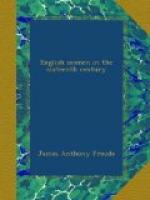En ego victa situ quam veri effeta senectus
Arma inter regum falsa formidine ludit:
Respice ad haec.
LECTURE VI
THE GREAT EXPEDITION TO THE WEST INDIES
Queen Elizabeth and her brother-in-law of Spain were reluctant champions of opposing principles. In themselves they had no wish to quarrel, but each was driven forward by fate and circumstance—Philip by the genius of the Catholic religion, Elizabeth by the enthusiasts for freedom and by the advice of statesmen who saw no safety for her except in daring. Both wished for peace, and refused to see that peace was impossible; but both were compelled to yield to their subjects’ eagerness. Philip had to threaten England with invasion; Elizabeth had to show Philip that England had a long arm, which Spanish wisdom would do well to fear. It was a singular position. Philip had outraged orthodoxy and dared the anger of Rome by maintaining an ambassador at Elizabeth’s Court after her excommunication. He had laboured for a reconciliation with a sincerity which his secret letters make it impossible to doubt. He had condescended even to sue for it, in spite of Drake and the voyage of the Pelican; yet he had helped the Pope to set Ireland in a flame. He had encouraged Elizabeth’s Catholic subjects in conspiracy after conspiracy. He had approved of attempts to dispose of her as he had disposed of the Prince of Orange. Elizabeth had retaliated, though with half a heart, by letting her soldiers volunteer into the service of the revolted Netherlands, by permitting English privateers to plunder the Spanish colonies, seize the gold ships, and revenge their own wrongs. Each, perhaps, had wished to show the other what an open war would cost them both, and each drew back when war appeared inevitable.
Events went their way. Holland and Zeeland, driven to extremity, had petitioned for incorporation with England; as a counter-stroke and a warning, Philip had arrested the English corn ships and imprisoned the owners and the crews. Her own fleet was nothing. The safety of the English shores depended on the spirit of the adventurers, and she could not afford to check the anger with which the news was received. To accept the offer of the States was war, and war she would not have. Herself, she would not act at all; but in her usual way she might let her subjects act for themselves, and plead, as Philip pleaded in excuse for the Inquisition, that she could not restrain them. And thus it was that in September 1585, Sir Francis Drake found himself with a fleet of twenty-five privateers and 2,500 men who had volunteered to serve with him under his own command. He had no distinct commission. The expedition had been fitted out as a private undertaking. Neither officers nor crews had been engaged for the service of the Crown. They received no wages. In the eye of the law they were pirates. They were going on their own




